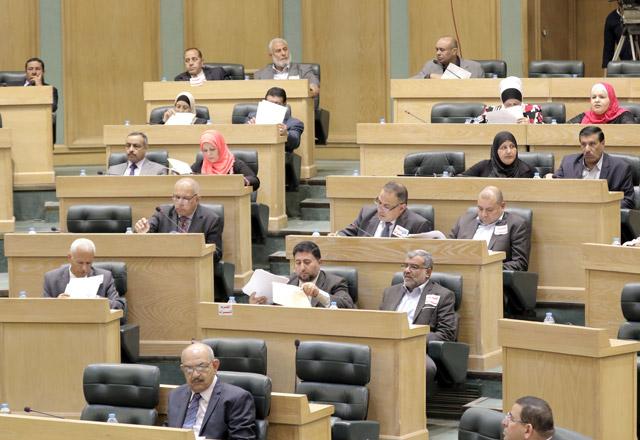You are here
Lower House calls for international action on Palestinian prisoners in Israel jails
By Jassar Al Tahat - May 02,2017 - Last updated at May 02,2017

Lawmakers are seen during a session on Tuesday (Photo by Osama Aqarbeh)
AMMAN — Lawmakers on Tuesday demanded international pressure on Israel to treat Palestinian prisoners in accordance with international law, during a legislative session which also approved the approval of a number of articles in the supervision and inspection of economic activities bill.
At the beginning of the session, the Secretary General of the Lower House read the Royal Decree to postpone the ordinary session starting Sunday.
MPs adopted a statement calling on international organisations to take swift actions to stop the suffering of Palestinian and other Arab prisoners in Israeli prisons and to pressure Israel to abide by international laws and conventions when dealing with prisoners.
Over 1000 Palestinian prisoners in Israeli detention began a hunger strike on April 16 to demand, among other things, “frequent and lengthy family visits, better prison conditions such as improved medical care, and an end to solitary confinement and administrative detention – detention without charge or trial,” according to Human Rights Watch.
Referring to a number of Jordanian citizens who are also reportedly imprisoned by Israel, MP Yihya Saud (Amman, 2nd District) said: “I wish that the Lower House would give this matter 10 minutes at minimum, knowing that there are 20 Jordanian prisoners among the prisoners [in Israeli jails] and I haven’t heard anything from the Ministry of Foreign Affairs.”
Lawmakers later continued to debate the supervision and inspection of economic activities bill, with some considering it a “modern and necessary law”, while others criticised it as “only fit for the private sector and offering a window for corruption”.
The draft law includes the proposed merger of processes of inspection and seeks to limit the overlap and duplication of the powers and functions of official bodies concerned with the supervision and inspection of economic activities, public health, food and drug safety, workers' rights, fire safety and licensing for vocational jobs and products. .
Deputy Prime Minister Mamdouh Abbadi said: “This bill is new to the Kingdom, and service, agricultural and industrial institutions are complaining because of the duplication of oversight from many institutions.”
“Implementing this law needs time and training for inspectors, and from the date of its publication in the [Official] Gazette, 180 days should be given to allow for the necessary training and organisation of the work,” Abbadi concluded.
Head of the Economy and Investment Committee, Kheirallah Abu Seileek, said: “This bill is a quantum leap and it comes after the private sector demanded it. It will give Jordan a better status in the [World Bank’s annual] Doing Business Report.”
“In the next economic forum, we need to present a law as a tool to encourage investment,” Kheirallah ended.
Representing Amman’s 3rd District, Saleh Armouti opposed the proposed bill, saying “I believe this law robs the powers from ministries and, as legislators, we cannot give in to the private sector or forum demands.”
Ahmad Riqib (Amman, 4th District) said “This law represents a circumvention of the effective supervisory bodies and encourages corporate gain, which serves bribery and nepotism.”
Meanwhile, Lower House Speaker Atef Tarawneh stated that the Lower House on Tuesday sent a response to the attorney general to demand clarification of the State Audit Bureau’s inquiries regarding former ministers.
“What has been circulating in the media is not accurate and we should not discuss a matter that is being viewed by the judiciary,” Tarawneh added.
Lawmakers referred a number of inquiries mentioned in the State Audit Bureau to the attorney general on April 18.
Related Articles
AMMAN — Lawmakers on Tuesday demanded international pressure on Israel to treat Palestinian prisoners in accordance with international
AMMAN — Lawmakers on Sunday approved two draft laws regarding patents and began discussing the amended bill of the civil aviation law during
AMMAN — Lawmakers on Tuesday approved amendments to the 2016 Tourism Law and discussed the draft civil aviation law. MPs approved the a
















